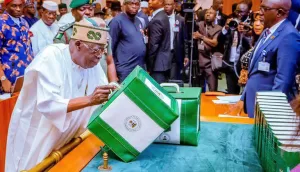President Bola Tinubu has presented a 2025 budget estimate of N47.9 trillion to a joint session of the National Assembly (NASS). This marks his second budget proposal to lawmakers, who were seated for the event on Wednesday.
Tinubu was accompanied by several top government officials, including the Secretary to the Government of the Federation, George Akume, and Chief of Staff Femi Gbajabiamila.
The presentation, initially scheduled for Tuesday, was postponed to Wednesday following a Federal Executive Council (FEC) meeting on Monday. The FEC had approved the budget estimate earlier that day.
The 2025 budget is projected to be 36.8% higher than the 2024 estimate, with an expenditure of N47.96 trillion.

The budget is based on an oil price benchmark of $75 per barrel, oil production of 2.06 million barrels per day, and an exchange rate of N1,400 to $1, according to Minister of Budget and National Planning Atiku Bagudu.
A significant aspect of the 2025 budget is the federal government’s plan to reduce Nigeria’s inflation rate from 34% in 2024 to 15% by 2025.
This reduction is expected to result from a series of economic reforms, including increased local petroleum refining, higher crude oil production, and improved agricultural output. These measures aim to stabilize commodity prices, strengthen the naira, and enhance foreign reserves.
A key factor in the strategy is the improvement of national security, which is expected to boost agricultural productivity and reduce food prices. The government projects that enhanced security will lead to a bumper harvest in 2025, easing inflationary pressures, particularly in food costs.
Additionally, the commencement of local refining is anticipated to reduce Nigeria’s reliance on imported refined petroleum, easing pressure on foreign exchange reserves and lowering fuel prices.

Increased domestic refining capacity will also provide a boost to foreign exchange earnings through exports.
READ ALSO: Nigeria’s Inflation Rate Rises To 34.6% In November 2024
The budget further outlines plans to increase crude oil production, which, alongside reductions in upstream production costs, will raise revenue generation.
This increase in revenue is expected to strengthen Nigeria’s fiscal position and build foreign exchange reserves, helping to stabilize the naira and reduce imported inflation.
The government also aims to attract greater foreign portfolio investments by fostering a stable macroeconomic environment and favorable policies. These investments will improve forex availability, ease exchange rate pressures, and contribute to reducing the cost of imported goods, supporting the goal of reducing inflation.
In his address to the National Assembly, President Tinubu emphasized the importance of these initiatives for building a stronger economy.
He stated, “By addressing the root causes of inflation—whether through boosting agricultural output, increasing local refining, or attracting foreign investments—we are building a stronger foundation for Nigeria’s economic future.”

